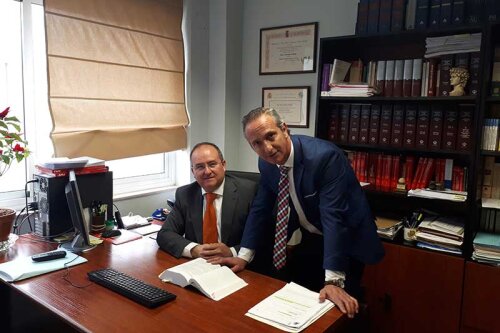Best Commercial Real Estate Lawyers in Cáceres
Share your needs with us, get contacted by law firms.
Free. Takes 2 min.
Free Guide to Hiring a Real Estate Lawyer
List of the best lawyers in Cáceres, Spain
About Commercial Real Estate Law in Cáceres, Spain
Commercial Real Estate law in Cáceres, Spain, governs the buying, selling, leasing, and management of properties used for business purposes. This field covers a wide range of properties, including offices, shops, warehouses, industrial spaces, and hospitality venues. Cáceres, as a historic city in the Extremadura region, presents unique opportunities and regulatory considerations for commercial real estate transactions, often influenced by local heritage protection ordinances and urban planning regulations. Commercial property dealings are subject to national laws, regional decrees, and municipal guidelines, making the legal landscape complex for individuals and businesses unfamiliar with the area.
Why You May Need a Lawyer
Engaging in commercial real estate within Cáceres often involves high-value transactions and complex legal agreements. You may require legal assistance in the following situations:
- Purchasing or selling commercial property
- Negotiating or drafting commercial lease agreements
- Understanding urban zoning restrictions and permitted land uses
- Managing or developing properties within protected heritage zones
- Resolving disputes over property boundaries or contract breaches
- Complying with tax obligations and registration procedures
- Conducting due diligence to uncover potential legal or financial liabilities
- Securing licenses or permits required to operate certain types of businesses
A specialized lawyer can help you avoid costly mistakes, protect your interests, and ensure that your investment complies with all applicable regulations.
Local Laws Overview
When dealing with commercial real estate in Cáceres, there are several important legal considerations:
- Land Registry (Registro de la Propiedad): All changes in property ownership must be officially recorded. A clear title is essential for legal security.
- Urban Planning (Plan General de Ordenación Urbana): The local government regulates land use, density, building heights, and permitted activities, which can significantly affect commercial property value and permissible business operations.
- Cadastral Registration: Property boundaries and classifications are logged with the Catastro. Discrepancies between cadastral and land registry data must be rectified before transactions.
- Heritage Protection: Many areas of Cáceres have protected status due to their historical significance. Renovation or change of use in these districts demands special permits and compliance with preservation laws.
- Leasing Laws: Spanish law sets out rights and obligations for commercial landlords and tenants, outlined primarily in the Ley de Arrendamientos Urbanos and the Código Civil. Contract terms can be negotiated but must respect minimum legal requirements and cannot contravene public interest.
- Taxation: Transactions involve taxes such as VAT (IVA), transfer tax (ITP), and municipal taxes like the plusvalía. Local and regional variations can apply.
Frequently Asked Questions
What types of commercial properties are common in Cáceres?
Cáceres offers retail spaces, office units, restaurants, hotels, warehouses, and properties for specialized uses like tourism or culture. Many are located in the historic center, while others are in modern business parks or industrial areas.
How do I verify ownership and title of a property?
You can request a Nota Simple from the local Land Registry (Registro de la Propiedad) to check the property’s ownership, description, charges, and encumbrances. A lawyer can help you interpret these details.
Can foreigners purchase commercial real estate in Cáceres?
Yes. Foreign individuals or entities can buy commercial property in Spain, including in Cáceres, provided they obtain a Foreigner Identification Number (NIE) and comply with local regulations.
Are there restrictions on renovating a historic property?
Yes. Properties in heritage-protected zones require additional permits for renovations or changes of use. Approval from local authorities is essential, and works must respect conservation guidelines.
What are the steps to close a commercial property transaction?
Typically, the process involves a reservation contract, due diligence, signing a public deed before a notary, payment of relevant taxes, and registration with the Land Registry. Legal assistance is advised at all stages.
What taxes are applicable when buying commercial real estate?
Buyers may pay Value Added Tax (IVA) or Transfer Tax (ITP), depending on whether the seller is an individual or a company, and Plusvalía Municipal (municipal capital gains tax) on property value increases.
How are commercial leases regulated?
Commercial leases are governed by the Ley de Arrendamientos Urbanos and the Spanish Civil Code. Parties have flexibility in negotiations, but leases must be in writing and comply with local laws.
Is it possible to carry out a change of use for a commercial property?
Yes, but you must apply for permission from the local council. Compliance with urban planning and zoning rules, as well as building or heritage regulations if applicable, is necessary.
What should I watch for in a commercial lease agreement?
Key issues include rent amount and increases, duration and renewal terms, use of premises, repair and maintenance obligations, and early termination clauses. Expert legal review is highly recommended.
How can disputes in commercial real estate be resolved?
Disputes can involve negotiation, mediation, or court proceedings. A local lawyer can help assess your situation and represent your interests in conflict resolution or litigation.
Additional Resources
If you need more information or official guidance, consider the following resources:
- Ayuntamiento de Cáceres (Cáceres City Council) - Urban planning, permits, and local regulations
- Registro de la Propiedad - Land Registry offices for property titles and encumbrances
- Agencia Tributaria - Spanish Tax Agency for information on applicable property taxes
- Colegio de Registradores de España - Public register for property transactions and legal information
- Colegio de Abogados de Cáceres - Local Bar Association for finding qualified real estate lawyers
- Catastro - Spanish Cadastral Office for property identification and classification
- Official databases of the Junta de Extremadura - Regional laws and decrees affecting real estate
Next Steps
If you are considering a commercial real estate transaction or facing a legal issue in Cáceres, start by gathering all relevant documents related to your property or potential investment. Consult with a local lawyer specializing in commercial real estate to review your case, clarify the legal requirements, and navigate the transaction process. Engage in due diligence before signing any agreements or making payments.
Legal professionals can also help with contract drafting, negotiations, permit applications, and dispute resolution. To find the right expertise, contact the Cáceres Bar Association or seek recommendations from trusted local professionals. Early legal consultation can save considerable time, money, and stress in complex commercial real estate matters.
Lawzana helps you find the best lawyers and law firms in Cáceres through a curated and pre-screened list of qualified legal professionals. Our platform offers rankings and detailed profiles of attorneys and law firms, allowing you to compare based on practice areas, including Commercial Real Estate, experience, and client feedback.
Each profile includes a description of the firm's areas of practice, client reviews, team members and partners, year of establishment, spoken languages, office locations, contact information, social media presence, and any published articles or resources. Most firms on our platform speak English and are experienced in both local and international legal matters.
Get a quote from top-rated law firms in Cáceres, Spain — quickly, securely, and without unnecessary hassle.
Disclaimer:
The information provided on this page is for general informational purposes only and does not constitute legal advice. While we strive to ensure the accuracy and relevance of the content, legal information may change over time, and interpretations of the law can vary. You should always consult with a qualified legal professional for advice specific to your situation.
We disclaim all liability for actions taken or not taken based on the content of this page. If you believe any information is incorrect or outdated, please contact us, and we will review and update it where appropriate.









